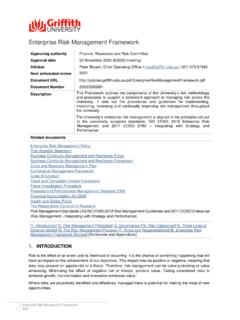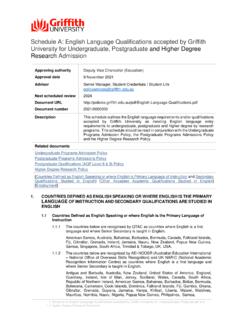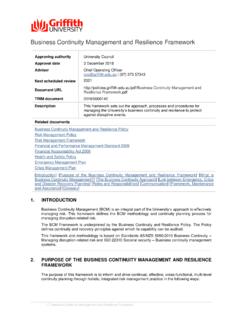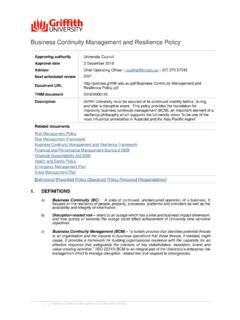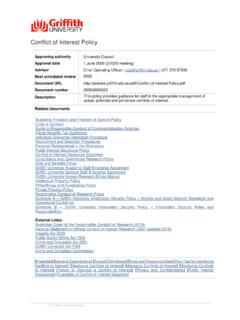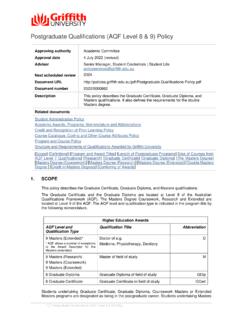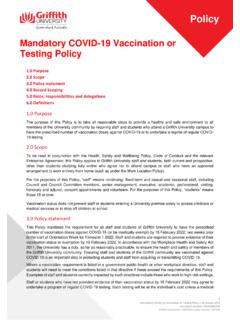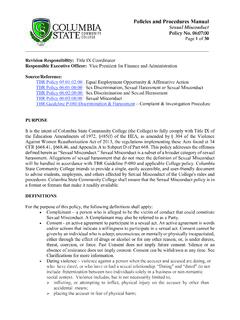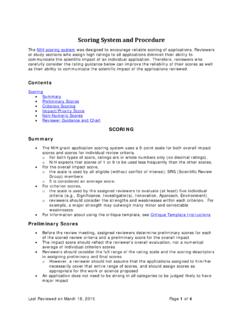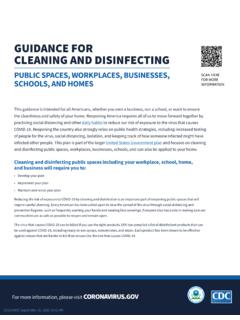Transcription of Code of Conduct - .NET Framework
1 1 Code of Conduct Code of Conduct Approving authority University Council Approval date 1 June 2020 (3/2020 meeting) Advisor Director, Human Resources Next scheduled review 2023 Document URL of Document number 2022/0001243 Description This Code of Conduct provides guidance on expected standards of behaviour and how staff are to Conduct their duties and related activities. Related documents Academic Freedom and Freedom of Speech Policy Assets Policy Code of Practice for the Supervision of HDR students Conflict of Interest Policy Consultancy and Commercial Research Policy Delegations Policy Delegations Procedure Delegations Register Equal Opportunity Policy Equity, Diversity and Inclusion Policy Expenditure of University Funds Guidelines Fraud and Corruption Control Policy Gifts and Benefits Policy Griffith University Academic Staff Enterprise Agreement Griffith University General Staff Enterprise Agreement Griffith Health Intramural Professional Practice Policy Guide to the Responsible Conduct of Commercialisation Activities Health and Safety Policy Individual Grievance Resolution Procedure Information Security Policy Intellectual Property Policy Motor Vehicle Policy Personal Relationships in the Workplace Privacy Plan Private Practice Guidelines to Conduct Clinical Practice within the Griffith Health Clinics Private Practice Policy
2 Public Interest Disclosure Policy Public Sector Ethics Act 1994 Purchasing Policy Information Management Policy Recruitment and Selection Policy Recruitment and Selection procedures Responsible Conduct of Research Policy 2 Code of Conduct students with Disabilities Policy University Credit Card Policy Information Technology Code of Practice Workplace Harassment, Bullying and Discrimination Policy [Introduction] [Application and Scope] [University Statement of Values and Commitments] [General Expectations] [Specific Expectations] [Compliance with the Code] [Limit on Confidentiality] 1. Introduction This Code of Conduct , which forms part of the terms of employment for staff, sets out the University s expectations with respect to staff professional and personal Conduct .
3 A key purpose of the Code is to promote integrity through ethical decision-making and behaviour. The Code refers to a range of policies which provide more detailed information on the University s expectations and requirements. Given the complexity of the modern university, a Code such as this, even with its associated policies, cannot provide definitive answers to all the integrity issues which may confront staff from time to time. Staff are required to exercise reasonable judgement regarding their professional and personal Conduct and when necessary consult their supervisor or relevant central offices if they are unsure about how to act or deal with a particular situation or issue.
4 Staff are required to comply with the Code and associated policies. Breaches of the Code or policies may result in disciplinary action. 2. Application and Scope The Code applies to all circumstances where staff are performing work, duties or functions for the University, as well as related activities such as work-related functions, travel, conferences and any circumstances where they are attending as a University staff member. The Code also applies, as relevant, to members of the University Council and its Committees who are not staff of the University. For the purposes of this Code, staff means continuing, fixed-term and casual staff, including senior management, executive, academic, general, visiting, honorary and adjunct, conjoint appointments and volunteers.
5 Breaches of the Code will be dealt with in accordance with section 6, Compliance with the Code. 3. University Statement of Core Commitments The University s Strategic Plan sets out that we will pursue our vision through our core principles of excellence, ethics and engagement. The Strategy is structured around six inter-related core commitments: Values, students , Research, People, Engagement and Infrastructure. The University s commitments are underpinned by core values of First Peoples, Diversity and Inclusion, and Environmental Sustainability and are aligned with the UN Sustainable Development Goals. 4. General Expectations In professional actions, and in dealing with other staff, students and the community, staff will be guided by the University's Statement of Values and Commitments, the University Strategic Plan, this Code, the University's policies and other documents contained within the Policy Library.
6 The Queensland Public Sector Ethics Act 1994 requires universities to have a Code of Conduct . The Act outlines four fundamental ethical principles which are considered essential to good public administration and should guide staff behaviour: integrity and impartiality; promoting the public good; 3 Code of Conduct commitment to the system of government; accountability and transparency. Expectations Staff are responsible for their own behaviour and are expected to Conduct themselves in the following manner with regard to University activities: behave honestly, with integrity and in a way that upholds the values and reputation of the University; act in a cooperative, responsive and helpful manner; act with care and diligence; ensure fairness in decision making; treat everyone with respect and courtesy and without discrimination or harassment; use University property and money efficiently, carefully and honestly with due authorisation and without misappropriation.
7 Comply with the ethical standards and legal requirements of their profession; comply with all applicable laws; comply in a timely manner with any lawful or reasonable direction given by a person with the authority to give the direction. The University expects its staff to remain informed about, act within the spirit of, and comply with University policies, directions and relevant legislation, as well as any regulatory requirements of their discipline or profession. Failure to act in accordance with these obligations will be dealt with in accordance with section 6 and can be a cause for investigation under the relevant misconduct provisions of the University Staff Enterprise Agreements.
8 Breaches of, or non-compliance with these obligations should be reported to a relevant senior officer. 5. Specific Expectations Set out below are the key areas of expectation, obligation and responsibility for staff under the Code. Relevant policy and procedures are highlighted and linked for ease of reference. A Safe Environment The University is committed to ensuring the health, safety and well-being of all staff, students , contractors and visitors while undertaking work, study or research activities. All staff are responsible to ensure a safe and healthy work environment. Related documents and links: Health and Safety Policy Health and Safety Accountabilities Incident Reporting procedures Health and Safety Resources Health and Wellbeing Fairness and Respect All members of the University are entitled to be treated with respect and provided equal opportunities regardless of personal, social, sexual or cultural characteristics.
9 They should also experience a work and study environment free from discrimination, harassment, bullying or vilification. The University will investigate all complaints within its relevant policies and in accordance with anti-discrimination and other applicable laws. The University will not tolerate victimisation of complainants. 4 Code of Conduct Staff members must use their official position properly and honestly. Improper use of a staff member s position includes actions which may result in detriment to the University or which result in real, potential or apparent advantage to a staff member, or any other person or organisation. The nature of student/staff interactions and the role of supervisors and managers may place a staff member in a position of power over other staff and students .
10 This imbalance of power creates the potential for undue influence of a student or more junior staff member, due to age or other factors such as the capacity to influence outcomes. In particular, the development of a personal or sexual relationship where a power imbalance exists creates the potential for abuse of position, for damage to the less empowered and potentially vulnerable individual, and for conflicts of interests. A staff member must not abuse or misuse a position of authority. Related documents: Equal Opportunity Policy Grievance Resolution procedures Recruitment and Selection Policy Recruitment and Selection procedures students with Disabilities Policy Workplace Harassment, Bullying and Discrimination Policy Conflict of Interest Policy Personal Relationships in the Workplace Policy Academic Freedom and Freedom of Speech Academic freedom and freedom of speech is an essential element to the Conduct of teaching and research in the University.

